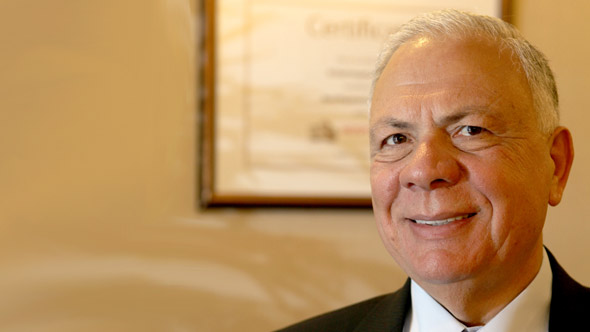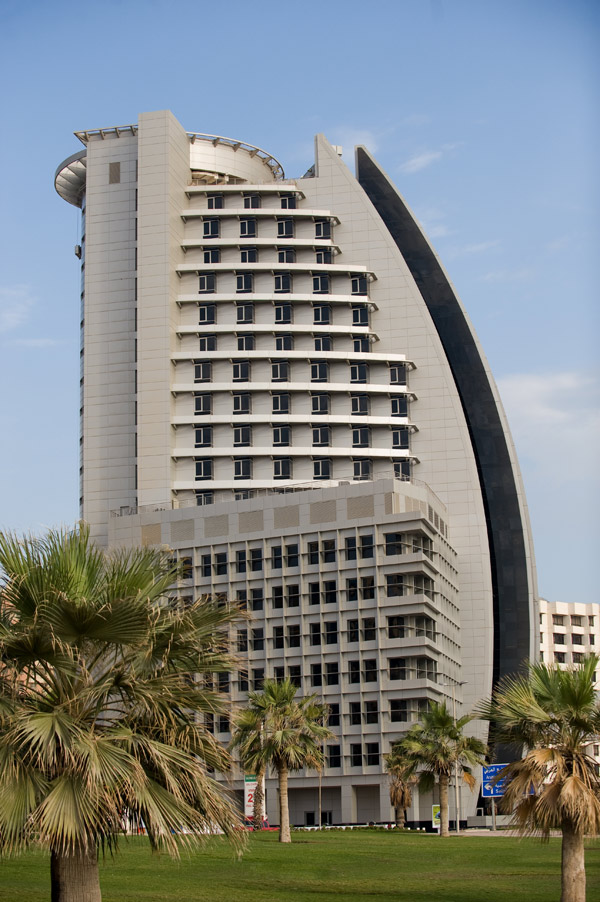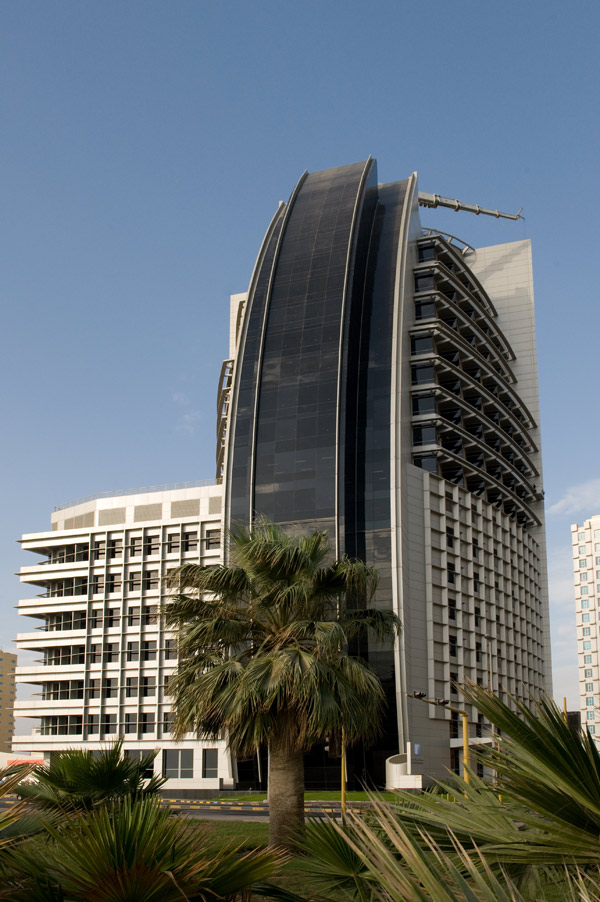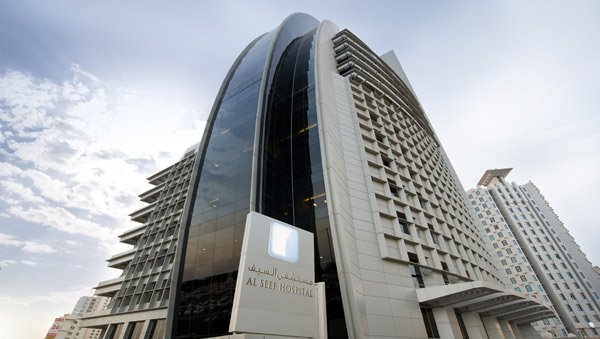Al Seef Hospital: Interview with the CEO of Al Seef Hospital
Interview with Mr. Yousif Abou Zahr, CEO of Al Seef Hospital. Al Seef hospital is a member of United Medical Service (UMS), which is the largest company in the private health care sector.

Could you present the United Medical Service, please?
Al Seef hospital is a member of United Medical Service (UMS), which the largest company in the private health care sector. The United Medical Care Services has under it a number of companies that are focused on different areas and services in the health care sector. Among them are hospitals and one of them is Al Seef hospital which is one hundred twenty beds hospital.
There is another hospital which will open within a year it is called “international hospital” which has 160 beds.
There is another hospital which will open within a year it is called “international hospital” which has 160 beds. It will also be a general hospital. United Laboratories Companies is another company under the group, it has central laboratory and satellite labs in most of the hospitals and clinics of the group. Under the UMS, there is also the international clinic which is a poly multidisciplinary clinic which has different branches distributed in highly populated areas in Kuwait.
There is another group or health care service under the UMS which is called “Maidan Clinic” which is a dental services clinic, there are 7 branches distributed in different areas in Kuwait and each branch has on the average twelve dental chairs. Also, there is a company that deals with medical supplies that it is called “United Medical technologies” that belongs also to the group. We have within the group a broad spectrum of medical services in terms of medical service provision and medical product as well as supplies. It is the largest group in the private sector that provides medical services.
 What is your assessment of the health care sector in Kuwait? What do you think it should be done to improve this sector? What are the challenges?
What is your assessment of the health care sector in Kuwait? What do you think it should be done to improve this sector? What are the challenges?
The public sector is the largest in the provision of health care services. It constitutes 90 percent of the market in number of beds and in services. Currently, the trend is to shift the services from the public to the private. The shifting in areas where the public cannot provide the service, especially in providing cosmetic surgeries, deliveries in a suite or in a luxurious room and in other areas where the public sector is not providing it to the level of the expectation of the patient or the consumer.
The public sector still dominates the market and it is providing the primary, secondary and tertiary services, whereas the private sector is focusing on the primary and secondary services. The private sector is booming and you can see that more hospitals are coming up because of the demand for the private sector services. The barriers that the patients are facing at the public are the availability of the doctors they want to see and the time at which they want to see the doctor, and the services they would like to have. There are always constraints regarding the accessibility to the services they need as a patient.
Although it is nearly for free, but some patients would like to pay to have more accessible services and to select the doctors they want, the appointments they want and the services they want. Private sector is benefitting from the insurance and the provision of health insurance to the private sector to the population and the ability of the patients to pay for the services. You have almost 60 percent of the population that are cash payers, while 40 percent are covered by health insurance companies and others are covered are governed by corporate accounts through large institutes.
Now, the trend is that the public is shifting towards the private. Big organizations like the petroleum companies such as KPC and others, they have provided private insurance to their patients, their staff and dependents. They have now access to the private sectors, hospitals and clinics. This relieves pressure from the public and provides the beneficiaries with adequate services and timely service.
Other institutes in the government are following the same. It is going to happen gradually so that the pressure will be released. The public sector will be relieved from providing services to the whole populations, to the Kuwaitis as well as expats. There are new projects that are being under preparation by the government to establish the health insurance for the expats whereby expats can benefit from such services whenever is needed. There is a corporate that will cover the expats population and will give them access either owned by the corporation that’s providing the service or by a third party.
How important is medical tourism to Kuwait? Does Kuwait have the capacity to accommodate the medical tourism?
The treatment abroad is driven by subspecialties that some of the hospitals in Kuwait are lacking. But Kuwait has the potential to provide all the services at high quality, to have people from the Gulf area and from even from the Middle East region to come to the hospitals in Kuwait and get the treatment they need. 
Al Aseef hospital has an agreement with a Belgian team to provide orthopedic surgery locally. It has also an agreement with other large international health institutes to provide the services locally. Other hospitals are moving in that direction by having collaboration with international institutes to provide the services locally. This will cut the expenses of treatment abroad and will create center of excellence in different specialties whereby patients can be attracted from Middle East and nearby region to have the medical services in Kuwait.
Is this planned to happen in the future or it is happening now?
It is happening currently and gradually. It has to happen incrementally. You have to start and expand until you meet the demands and the quality of services required. At the moment, it is not fully adequate to eliminate the treatment abroad or attract patients to come and be treated in Kuwait. But, Kuwait is moving in that direction.
The private sector is in the direction towards providing centers of excellence and attracting patients of the region. Al Seef hospital is preparing to develop center of excellence in orthopedic and spinal surgery to serve Kuwait and the region. The service that can be provided in Europe and in the United States will be provided here. The first steps have been taken and we are in the process of achieving this state of center of excellence within a year, mainly excellence in orthopedic and spinal surgeries. This is our focus at the moment.
There is a demand. Most of the treatments abroad are either spinal surgery, hip replacement or orthopedic surgery. The majority of the demand is in that direction. Other cases such as open heart surgery are being done very well and very professionally in Kuwait public hospitals. Cancer treatments are being done very efficiently to high standard levels in public hospitals. But there is a gap in the area of orthopedic and spinal surgeries. There is a demand that it is beyond the supply, it is currently being provided in quality but limited capacity.
Is there more demand than supply in the market?
We have 8 hospitals with average capacity if 100 bed each; there is a room for expansion.
If you look at the private sector in Kuwait, it is young and still growing. We have 8 hospitals with average capacity of 100 beds each; there is a room for expansion. It is a supply driven market. There is a demand because it is not being satisfied by the public sector which is the majority. The private sector is focusing on main services like customer satisfaction, provision of quality health care, patient comfort, accessibility and convenience to the patient, customization of the services to the local needs, establishing collaborations with international institutes to provide quality services at the hospital, and developing of the international consultants visitng program whereby quality health care can be provided locally and at the convenience of the patient.
There are aspects that attract patients to the private sector. The most obvious one is the accessibility, convenience, comfort. In time, they can select the appointment and the doctor they want to see and even select the room they want to stay in at the hospital because the private sector provides for the patients rooms of different classes: you can have the standard room, the VIP room, royal suite..ect.. It caters to the needs of the customers of the populations that are seeking the services. This the public cannot provide because it is providing services to all, here we are providing services to our patient, and it is patient based. It is more focused service.
What would you identify as your main challenge, at the operational and strategic levels?
The main challenge that is facing the private sector is the expansion of services to other tertiary care. As a hospital, you cannot stop at a certain level of care; you have to continue until you satisfy all levels of care. The private sector should be able at some point to be handling tertiary care such as open heart surgery, cancer treatment, traumas, because it has the capacity and has the capability to do it . It can arrange for having the skills, equipment needed to cope with all types of service levels because the cancer and the trauma patients they have also the right to have access to the private sector and select the service that they need.
The challenge to provide the service is to overcome probably two obstacles: one is the limitation the ministry of health has put on licensing the tertiary care in private hospitals. Tertiary care means cancer treatment, organ transplant, open heart operations the kind of care that is more intensive and critical. The government is putting control so that it can be monitored and controlled safely by its agencies.
The private sector can be ready to handle such services but there are licensing and financing issues. It is capital intensive and the patient needs to be financed by the government or a third party because tertiary care is expensive and some insurance companies don’t cover them. There should be a kind of financial arrangement for the patient by the governmental body, if this service is going to be handled by the private sector.
They have already started the process. Some hospitals have started slowly going in the cardiac surgery as a first step. The private sector has a long way to go because of the regulations, readiness and the experience and the investments it takes to provide the services.
Compared to other countries, is it as difficult or easier? These challenges are they specific to Kuwait?
Usually, in the Gulf region, most of the tertiary care is handled by the government hospitals, by the public sector. This sector is usually taking care of the primary and secondary. But in some countries, they have allowed some services to be provided by the private. The challenges are everywhere is the private sector. Of course, there should regulations to monitor the equality, capacity and capability. But if you meet the qualifications then you should be able to provide the service.
Are the challenges are due to government restrictions and the law?
When the laws are reformed, they can be applied to the private sector in regulating and controlling the provision of the service, I think at that stage it will be more feasible.
What are your challenges in regards to the Al Seef hospital?
Al Seef hospital was built with the concept that it will have a futuristic design. The design is environmentally friendly. Actually, the hospital has been selected as the best hospital in physical environment and design in the hospital build awards conference that was held in Dubai last June among more than a 100 hospitals that were nominated. 
Our hospital won the first prize for its environmental design and its physical layout and accessibility. The shape of Al Seef is the shape of a sail. The slogan of Al Seef is ”sail with our care” which is translated in the design or the service we are providing.
Al Seef hospital was opened in late 2009, early 2010 and in two years we were able to be among the leading health care providers in Kuwait. Currently all the medical and surgical services are provided in the hospital. We have a very active international visiting consultants program. We have the latest technology when it comes to equipment, facility, and layout. We are the only hospital with a digital theatre. We have highly equipped advanced intensive care unit.
The hospital also is designed in a way that all patient rooms have a sea view. This adds to the healing process because it adds comfort to the patients. Most of our doctors are American or Canadian board certified or they hold a fellowship from UK. We have proven to be a center of plastic and bariatric surgery in the private sector where most of the plastic surgery and bariatric surgery operations have been performed. We also have been providing services to all the population whether cash payers or those who are covered by insurance. We have agreements with all insurance companies.
The challenges we are facing are initially in the recruitment process when you have to be selective to choose the best doctor, the best nurse and the best technician so that you can have the optimal combination of facility, main power, and equipment. All selected are to be according to a certain level of quality and performance so they can deliver the quality service they are supposed to be delivering.
This was the main challenge to find the right people for the job, and finding highly skilled doctors and nurses and attract them to work within our environment, and working according to our terms of quality service provision and international standards of quality provision. We have an ongoing training program to our staff to train them on the latest international standards and quality as well as medical protocols. We encourage our doctors to continue their medical education either locally or abroad and facilitate the process for them.
Our main goal is to be the high quality providers of medical services in Kuwait and in the region. Currently, we are focusing on establishing centers of excellence in the areas of orthopedic and spinal surgeries as well as bariatric surgery.